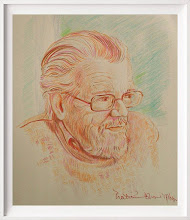Well, not really, no. Watercolourists might like to think so, but provided the watercolour is planned, and you realize you must work from light to dark, it isn't that hard.
BUT - watercolour can't half go wrong! (I speak with feeling: mine just did.) And if it does, there's very little you can do to rescue it - actually even that's a half truth. You can do a lot by overworking it with pastel, or with opaque acrylic - Chromacolour acrylic is one of the best for this (update that website, Chromacolour .... you said you were going to months ago). But of course once you do that, you don't really have a watercolour any more. People may, and often do, pretend that acrylic paintings are really watercolour, because they're painted with water, but we all know that's a little fib.
Or a whopping great lie, depending on preference.
There are water-soluble oils available now: are THEY watercolours too? Pull the other one.
So if a watercolour turns turtle on you, and you don't want to turn it into a mixed-media work, you've not much choice other than to bin it. But that's just a feature of the paint and the technique: it doesn't make watercolour painting intrinsically harder than any other medium. I've sweated more blood over oil paintings than I ever have over watercolour, even given the number of the latter I've torn up into little pieces while using language mother never taught me.
And there again, there are those who insist on "pure watercolour", by which they mean transparent paint with no body colour - white, in other words - mixed with it. You have to wonder how far they're prepared to take this - there IS body colour in a number of watercolour paints; some are just more opaque than others: eg, Light Red; the Cadmium colours; Turner's Yellow; Naples Yellow; Venetian Red. Would the "pure" watercolourists argue that these aren't pure watercolours? When, anyway, did pure watercolour - which I take to be the use of transparent single pigments, really - become a mark of refinement and distinction? Turner, Constable, Palmer, Cox, Cotman, Girtin, used whatever came their way to achieve their paintings: it's not a method sanctioned by time and custom - it's just that at some point I've been unable to trace, someone decided that the traditional English watercolour was actually nothing like traditional English watercolours, and instead invented a "classic" form of the medium entirely based on transparent washes on white paper.
It would be interesting to find out who it was who began this tradition - I suspect it's very much a 20th century phenomenon.
As it happens, I love a transparent watercolour - clear, clean washes laid over the paper, minimal colour mixing on the palette, colour dropped in to other colours to achieve optical mixing. But I could do without the hint of snobbishness about the method - as if it's the "right" way to paint in watercolour. It may be right for you, but don't erect a fence of prissiness around it and look down on other (and actually older) methods, the while assuring everyone how "difficult" it is. The technique is hit and miss, that's all: that makes it infuriating at times, but no harder than other media - painting is quite hard: if it weren't, no one would waste their time on it.
Friday, 1 May 2015
Subscribe to:
Post Comments (Atom)

Here, here Robert, I agree entirely with everything that you have said. Many a revered water-colourist has used what the Victorians used to refer to as body-colour highlights which we now refer to as Gouache which is slightly more opaque than Chinese white but has a very similar effect, I too have often used this to retrieve a failed water-colour. Watercolour isn't harder to use than other mediums it just takes a little more planning and needs a slightly better memory than I seem to have. As you know I use Water-mixable oils and some purists (or is that snobs?) reckon that this is not real oil painting but those of us in the know know that the pigments are exactly the same but the linseed oil has been altered to break down in water. I say all the rules are there to be broken, if it works for you and you get the results that you want then how can it be wrong?
ReplyDeleteA further thought has just occurred to me; what do you think the watercolour purist would make of the knowledge that on occasion when Turner was out and about creating his water-colour sketches/paintings he used to use his own created water in his paintings? Yes that's right, his urine, not quite so pure eh?
ReplyDelete